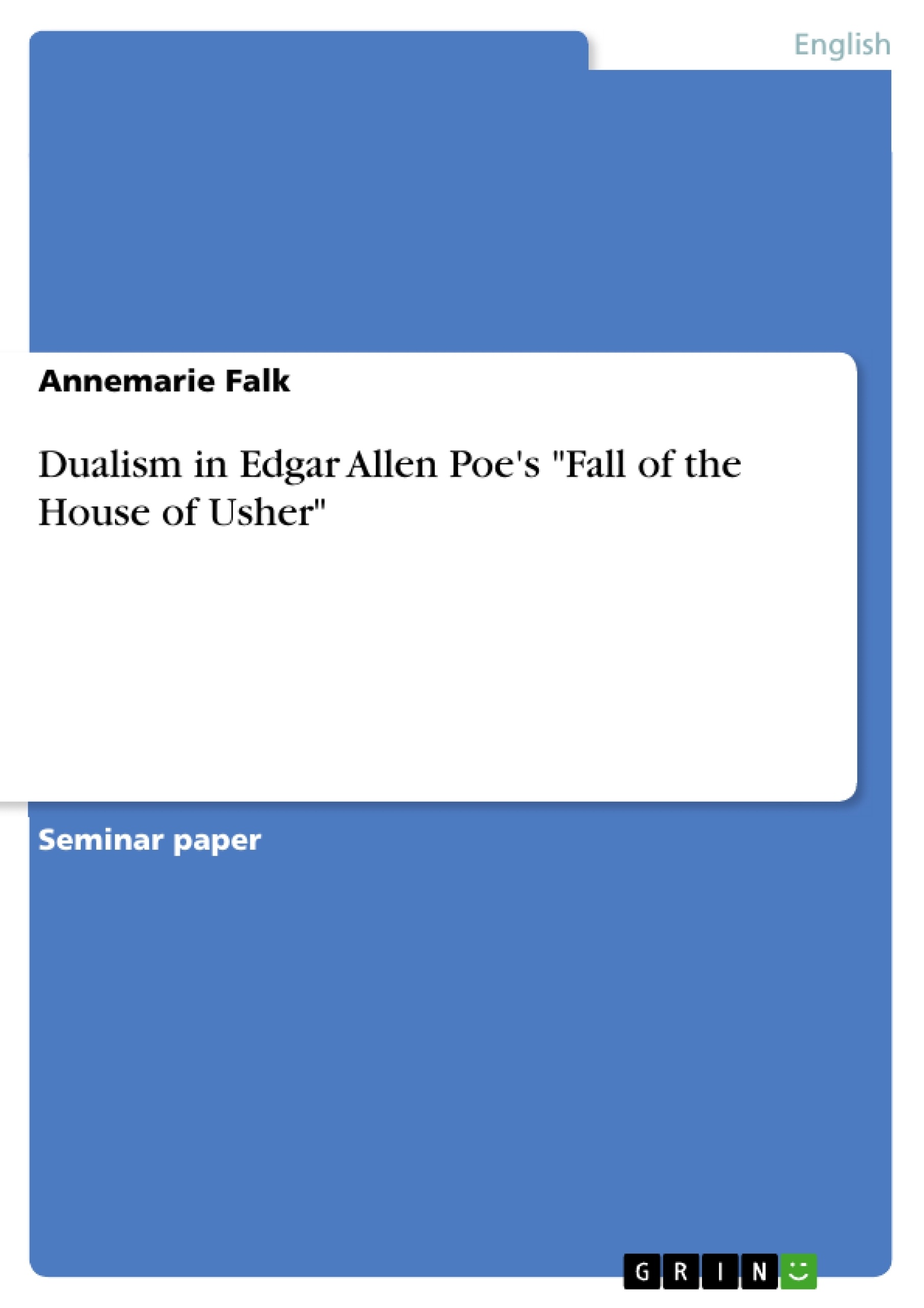In 19th century literature, whether it be prose or poetry, there is a central idea, a certain motif that can be found in many works - the concept of dualism. Many Victorians believed that there was an essential duality of life that was not only found in nature, but also constituted the very, dual nature of mankind. This concept has long before been discussed by the French philosopher and mathematician René Descartes who coined the term “Cartesian Dualism“, which approaches the idea that the self is divided into body and mind and that the two, while always conflicting, are intimately related (Skirry). In terms of literature, this conflict and idea of fragmentation of the human mind was often “expressed with the character‘s self-division or selfduplication“ (Krehl 1).
Inhaltsverzeichnis (Table of Contents)
- Dualism in Edgar Allen Poe's "The Fall of the House of Usher"
- The Transitoriness and First Obvious Contrast
- The House and Its Inhabitants
- The Dual Nature of Existence
Zielsetzung und Themenschwerpunkte (Objectives and Key Themes)
This paper explores the concept of dualism and its role in Edgar Allan Poe's "The Fall of the House of Usher," analyzing how Poe utilizes this motif to convey the complex and conflicted nature of the human self. The paper examines the dualistic elements within the setting, character relations, and the story's overall narrative.
- The concept of dualism in 19th-century literature, particularly in the works of Edgar Allan Poe
- The use of opposites, mirror images, and the doppelgänger motif in Poe's short story
- The theme of transitoriness and its relationship to the dual nature of existence
- The interplay between the real and the surreal in Poe's narrative
- The significance of the house as a representation of the Usher family's decay
Zusammenfassung der Kapitel (Chapter Summaries)
The paper begins by examining the setting of the story, focusing on the atmosphere of decay and transitoriness present in the descriptions of the Usher mansion and its surroundings. The paper then explores the parallels between the house and its inhabitants, Roderick and Madeline Usher, arguing that the house's physical deterioration reflects the declining mental and physical states of the characters. The paper concludes by discussing the dualistic nature of existence, suggesting that every element in Poe's story serves to emphasize this concept.
Schlüsselwörter (Keywords)
The key words and focus topics of this paper include dualism, Cartesian Dualism, transitoriness, opposites, mirror images, the doppelgänger motif, the real and the surreal, Gothic literature, decay, and the complex nature of the human self. The analysis centers on Edgar Allan Poe's short story "The Fall of the House of Usher," examining the story's themes, symbolism, and narrative structure.
Frequently Asked Questions
What is the central theme of dualism in Poe's story?
The paper explores the concept of dualism as the division between mind and body, expressed through mirror images, doppelgängers, and the relationship between the house and its inhabitants.
How does Cartesian Dualism relate to "The Fall of the House of Usher"?
Based on René Descartes' theory, the story illustrates the conflict between the mental and physical self, often showing the fragmentation of the human mind through character self-division.
What does the Usher mansion represent in the story?
The house serves as a physical mirror of the Usher family's decay; its deterioration reflects the declining mental and physical health of Roderick and Madeline Usher.
What is the significance of the doppelgänger motif?
Poe uses the doppelgänger motif to emphasize the duality of nature and the internal conflict within a single persona, a common theme in 19th-century Gothic literature.
How does Poe blend the real and the surreal?
The narrative utilizes an atmosphere of transitoriness and decay to blur the lines between reality and the supernatural, highlighting the dual nature of existence.
What are the key Gothic elements discussed?
Key elements include the atmosphere of decay, the isolated setting, mirror imagery, and the psychological disintegration of the characters.
- Quote paper
- Annemarie Falk (Author), 2013, Dualism in Edgar Allen Poe's "Fall of the House of Usher", Munich, GRIN Verlag, https://www.grin.com/document/230687



